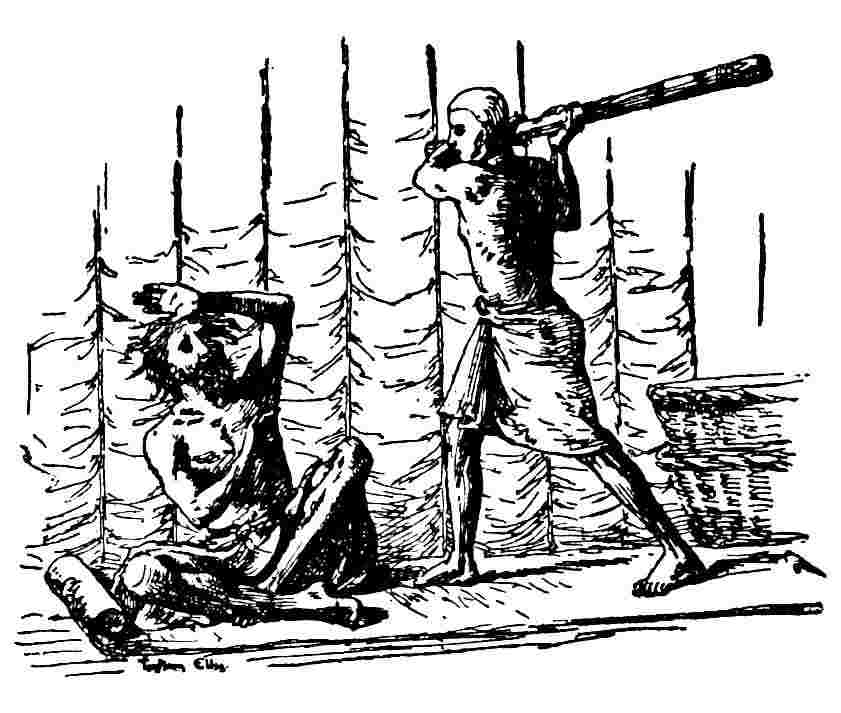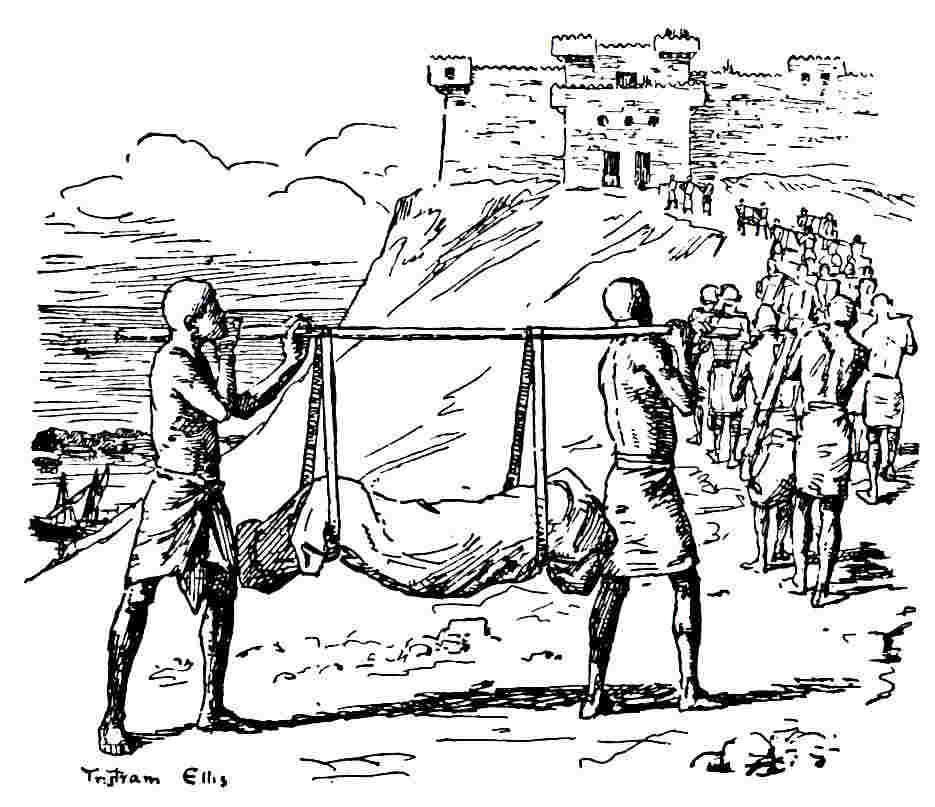| Go to Overview Page. | File Modified: 2012-11-24 |
There was once in the time of King Men-kheper-ra a revolt of the servants of his majesty who were in Joppa; and his majesty said, "Let Tahutia go with his footmen and destroy this wicked Foe in Joppa." And he called one of his followers, and said moreover, "Hide thou my great cane, which works wonders, in the baggage of Tahutia that my power may go with him."

Now when Tahutia came near to Joppa, with all the footmen of Pharaoh, he sent unto the Foe in Joppa, and said, "Behold now his majesty, King Men-kheper-ra, has sent all this great army against thee; but what is that if my heart is as thy heart? Do thou come, and let us talk in the field, and see each other face to face." So Tahutia came with certain of his men; and the Foe in Joppa came likewise, but his charioteer that was with him was true of heart unto the king of Egypt. And they spoke with one another in his great tent, which Tahutia had placed far off from the soldiers. But Tahutia had made ready two hundred sacks, with cords and fetters, and had made a great sack of skins with bronze fetters, and many baskets: and they were in his tent, the sacks and the baskets, and he had placed them as the forage for the horses is put in baskets. For whilst the Foe in Joppa drank with Tahutia, the people who were with him drank with the footmen of Pharaoh, and made merry with them. And when their bout of drinking was past, Tahutia said to the Foe in Joppa, "If it please thee, while I remain with the women and children of thy own city, let one bring of my people with their horses, that they may give them provender, or let one of the Apuro run to fetch them." So they came, and hobbled their horses, and gave them provender, and one found the great cane of Men-kheper-ra (Tahutmes III.), and came to tell of it to Tahutia. And thereupon the Foe in Joppa said to Tahutia, "My heart is set on examining the great cane of Men-kheper-ra, which is named '. . . tautnefer.' By the ka of the King Men-kheper-ra it will be in thy hands to-day; now do thou well and bring thou it to me." And Tahutia did thus, and he brought the cane of King Men-kheper-ra. And he laid hold on the Foe in Joppa by his garment, and he arose and stood up, and said, "Look on me, O Foe in Joppa; here is the great cane of King Men-kheper-ra, the terrible lion, the son of Sekhet, to whom Amen his father gives power and strength." And he raised his hand and struck the forehead of the Foe in Joppa, and he fell helpless before him. He put him in the sack of skins and he bound with gyves the hands of the Foe in Joppa, and put on his feet the fetters with four rings. And he made them bring the two hundred sacks which he had cleaned, and made to enter into them two hundred soldiers, and filled the hollows with cords and fetters of wood, he sealed them with a seal, and added to them their rope-nets and the poles to bear them. And he put every strong footman to bear them, in all six hundred men, and said to them, "When you come into the town you shall open your burdens, you shall seize on all the inhabitants of the town, and you shall quickly put fetters upon them,"

Then one went out and said unto the charioteer of the Foe in Joppa, "Thy master is fallen; go, say to thy mistress, 'A pleasant message! For Sutekh has given Tahutia to us, with his wife and his children; behold the beginning of their tribute,' that she may comprehend the two hundred sacks, which are full of men and cords and fetters." So he went before them to please the heart of his mistress, saying, "We have laid hands on Tahutia." Then the gates of the city were opened before the footmen: they entered the city, they opened their burdens, they laid hands on them of the city, both small and great, they put on them the cords and fetters quickly; the power of Pharaoh seized upon that city. After he had rested Tahutia sent a message to Egypt to the King Men-kheper-ra his lord, saying, "Be pleased, for Amen thy good father has given to thee the Foe in Joppa, together with all his people, likewise also his city. Send, therefore, people to take them as captives that thou mayest fill the house of thy father Amen Ra, king of the gods, with men-servants and maid-servants, and that they may be overthrown beneath thy feet for ever and ever."
This tale of the taking of Joppa appears to be probably on an historical basis. Tahutia was a well-known officer of Tahutmes III.; and the splendid embossed dish of weighty gold which the king presented to him is one of the principal treasures of the Louvre museum. It is ornamented with groups of fish in the flat bottom, and a long inscription around the side.
Unfortunately the earlier part of this tale has been lost; but in order to render it intelligible I have restored an opening to it, without introducing any details but what are alluded to, or necessitated, by the existing story. The original text begins at the star.
It is evident that the basis of the tale is the stratagem of the Egyptian general, offering to make friends with the rebel of Joppa, while he sought to trap him. To a Western soldier such an unblushing offer of being treacherous to his master the king would be enough to make the good faith of his proposals to the enemy very doubtful. But in the East offers of wholesale desertion are not rare. In Greek history it was quite an open question whether Athens or Persia would retain a general's service; in Byzantine history a commander might be in favour with the Khalif one year and with the Autokrator the next; and in the present century the entire transfer of the Turkish fleet to Mohammed Ali in 1840 is a grand instance of such a case.
The scheme of taking a fortress by means of smuggling in soldiers hidden in packages has often recurred in history; but this taking of Joppa is the oldest tale of the kind yet known. Following this we have the wooden horse of Troy. Then comes in mediaeval times the Arab scheme for taking Edessa, in 1038 A.D., by a train of five hundred camels bearing presents for the Autokrator at Constantinople. The governor of Edessa declined to admit such travellers, and a bystander, hearing some talking in the baskets slung on the camels, soon gave the alarm, which led to the destruction of the whole party; the chief alone, less hands, ears, and nose, being left to take the tale back to Bagdad. And in fiction there are the stories of a lady avenging her husband by introducing men hidden in skins, and the best known version of all in the "Arabian Nights," of Ali Baba and the thieves.
It appears from the tale that the conference of Tahutia with the rebel took place between the town and the Egyptian army, but near the town. Then Tahutia proposes to go into the town as a pledge of his sincerity, while the men of the town were to supply his troops with fodder. But he appears to have remained talking with the rebel in the tent, until the lucky chance of the stick turned up. This cleared the way for a neater management of his plan, by enabling him to quietly make away with the chief, without exciting his suspicions beforehand.
The name of the cane of the king is partly illegible; but we know how many actual sticks and personal objects have their own names inscribed on them. Nothing had a real entity to the Egyptian mind without an individual name belonging to it.
The message sent by the charioteer presupposes that he was in the secret; and he must therefore have been an Egyptian who had not heartily joined in the rebellion. From the conclusion we see that the captives taken as slaves to Egypt were by no means only prisoners of war, but were the ordinary civil inhabitants of the conquered cities, "them of the city, both small and great."
The gold dish which the king gave to the tomb of Tahuti is so splendid that it deserves some notice, especially as it has never been published in England. It is circular, about seven inches across, with vertical sides an inch high. The inside of the bottom bears a boss and rosette in the centre, a line of swimming fish around that, and beyond all a chain of lotus flowers. On the upright edge is an incised inscription, "Given in praise by the king of Upper and Lower Egypt, Ra-men-kheper, to the hereditary chief, the divine father, the beloved by God, filling the heart of the king in all foreign lands and in the isles in the midst of the great sea, filling stores with lazuli, electrum, and gold, keeper of all foreign lands, keeper of the troops, praised by the good gold lord of both lands and his ka, the royal scribe Tahuti deceased." This splendid piece of gold work was therefore given in honour of Tahuti at his funeral, to be placed in his tomb for the use of his ka. The weight of it is very nearly a troy pound, being 5,729 grains or four utens. The allusion on it to the Mediterranean wars of Tahuti, "satisfying the king in all foreign lands and in the isles in the midst of the great sea," is just in accord with this tale of the conquest of Joppa.
Beside this golden bowl there are many other objects from Tahuti's tomb which must have been very rich, and have escaped plundering until this century. A silver dish, broken, and a canopic jar of alabaster, are in Paris; another canopic jar, a palette, a kohl vase, and a heart scarab set in gold, are in Leyden; while in Darmstadt is the dagger of this great general. This piece of a popular tale founded on an incident of his Syrian wars has curiously survived, while the more solid official records of his conquests has perished in the wreck of history. His tomb even is unknown, although it has been plundered; perhaps his active life of foreign service did not give him that leisure to carve and decorate it, which was so laboriously spent by the home-living dignitaries of Thebes,